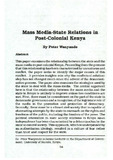| dc.description.abstract | This paper examines the relationship between the state and the
mass media in post colonial Kenya. Proceeding from the premise
that this relationship has been characterized by uneasiness and
conflict, the paper seeks to identify the major causes of this
conflict. It provides insights into why the conflictual relationship has not changed much since the advent of the democratization process. The paper also examines the strategies used by
the state to deal with the mass media. The central argument
here is that the relationship between the mass media and the
state in Kenya is unlikely to improve unless two conditions are
met. First, there must be commitment on the part of the state to
democratic governance and a recognition of the legitimate role of
the media in the promotion and protection of democracy.
Secondly, there must be a vibrant civil society that is capable of
obstructing attempts by the state to encroach on the rights and
freedoms of the public, including the freedom of the press. The
political orientation in state society relations in Kenya since
independence has been characterized by a determination by the
state to control society. This approach, which is underpinned by
an authoritarian ideology, resulted in a culture of fear rather
than trust and respect for the state. | en |

